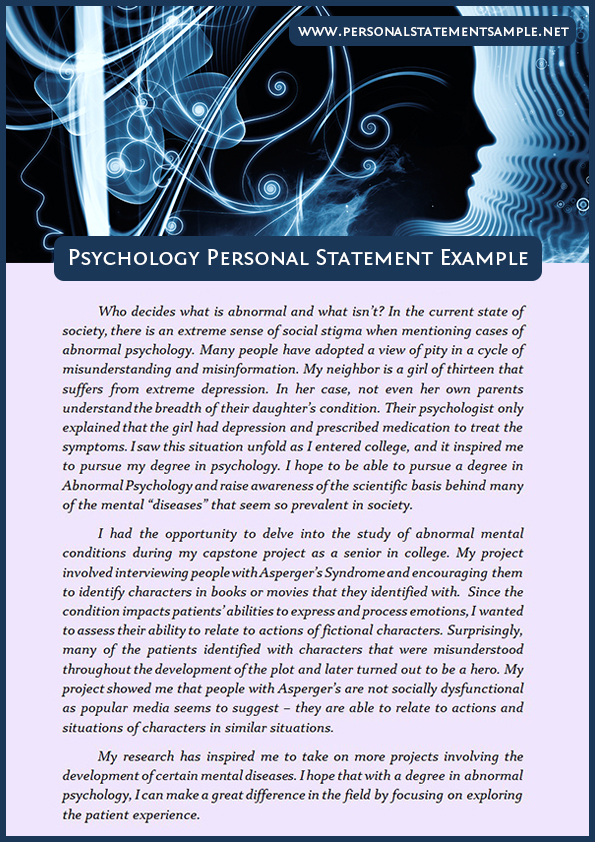Sample Personal Statement Psychology: Boosts Admission Chances

When it comes to applying for a psychology program, a well-crafted personal statement can significantly boost admission chances. A personal statement is a written essay that provides an opportunity for applicants to showcase their passion, motivation, and suitability for the field of psychology. In this article, we will delve into the world of personal statements for psychology programs, exploring the key elements that make a strong statement, and providing expert tips and advice on how to craft a compelling and effective essay.
Understanding the Importance of a Personal Statement in Psychology Applications

A personal statement is a critical component of the application process for psychology programs. It allows applicants to stand out from the crowd, demonstrating their unique strengths, experiences, and interests. A well-written personal statement can make a significant difference in the admission decision, as it provides a more personal and nuanced understanding of the applicant’s background and motivations. According to admissions experts, a personal statement can account for up to 50% of the overall application decision. Therefore, it is essential to devote sufficient time and effort to crafting a high-quality personal statement.
Key Elements of a Strong Personal Statement for Psychology Programs
A strong personal statement for a psychology program should include several key elements. These include a clear and concise introduction, a well-structured body, and a compelling conclusion. The introduction should provide a brief overview of the applicant’s background and interests, while the body should delve deeper into their experiences, skills, and motivations. The conclusion should summarize the applicant’s main points and reiterate their passion for the field of psychology. Cognitive psychology and research methods are essential areas of study in psychology, and applicants should demonstrate their understanding of these concepts in their personal statement.
| Key Element | Description |
|---|---|
| Introduction | Clear and concise overview of the applicant's background and interests |
| Body | Well-structured discussion of the applicant's experiences, skills, and motivations |
| Conclusion | Compelling summary of the applicant's main points and reiteration of their passion for psychology |

Crafting a Compelling Personal Statement: Tips and Advice

Crafting a compelling personal statement requires careful planning, research, and writing. Applicants should start by researching the psychology program and institution they are applying to, and identifying the key skills and experiences that are valued by the admissions committee. They should then use this information to inform their personal statement, highlighting their relevant skills and experiences, and demonstrating their passion for the field of psychology. It is also essential to use clear and concise language, avoiding jargon and technical terms that may be unfamiliar to non-experts.
Common Mistakes to Avoid in Personal Statements for Psychology Programs
There are several common mistakes that applicants should avoid when crafting a personal statement for a psychology program. These include using generic language and clichés, failing to proofread and edit the statement, and neglecting to provide specific examples and anecdotes. Applicants should also avoid using overly technical language, and should focus on demonstrating their passion and motivation for the field of psychology. Statistical analysis and research design are critical skills in psychology, and applicants should demonstrate their understanding of these concepts in their personal statement.
- Using generic language and clichés
- Failing to proofread and edit the statement
- Neglecting to provide specific examples and anecdotes
- Using overly technical language
Conclusion and Future Implications
In conclusion, a well-crafted personal statement is essential for boosting admission chances to a psychology program. By understanding the key elements of a strong personal statement, and avoiding common mistakes, applicants can craft a compelling and effective essay that showcases their passion and motivation for the field of psychology. As the field of psychology continues to evolve and grow, it is essential that applicants demonstrate their ability to adapt and innovate, and to apply theoretical concepts to real-world situations. By following these tips and advice, applicants can increase their chances of success, and take the first step towards a rewarding and challenging career in psychology.
What is the main purpose of a personal statement in a psychology application?
+The main purpose of a personal statement in a psychology application is to provide a more personal and nuanced understanding of the applicant’s background and motivations, and to demonstrate their passion and suitability for the field of psychology.
What are the key elements of a strong personal statement for a psychology program?
+The key elements of a strong personal statement for a psychology program include a clear and concise introduction, a well-structured body, and a compelling conclusion. The statement should also demonstrate the applicant’s understanding of key concepts in psychology, such as cognitive psychology and research methods.
How can applicants avoid common mistakes in their personal statement?
+Applicants can avoid common mistakes in their personal statement by using specific examples and anecdotes, avoiding generic language and clichés, and seeking feedback from others. They should also proofread and edit their statement carefully, and ensure that it is well-structured and easy to follow.



